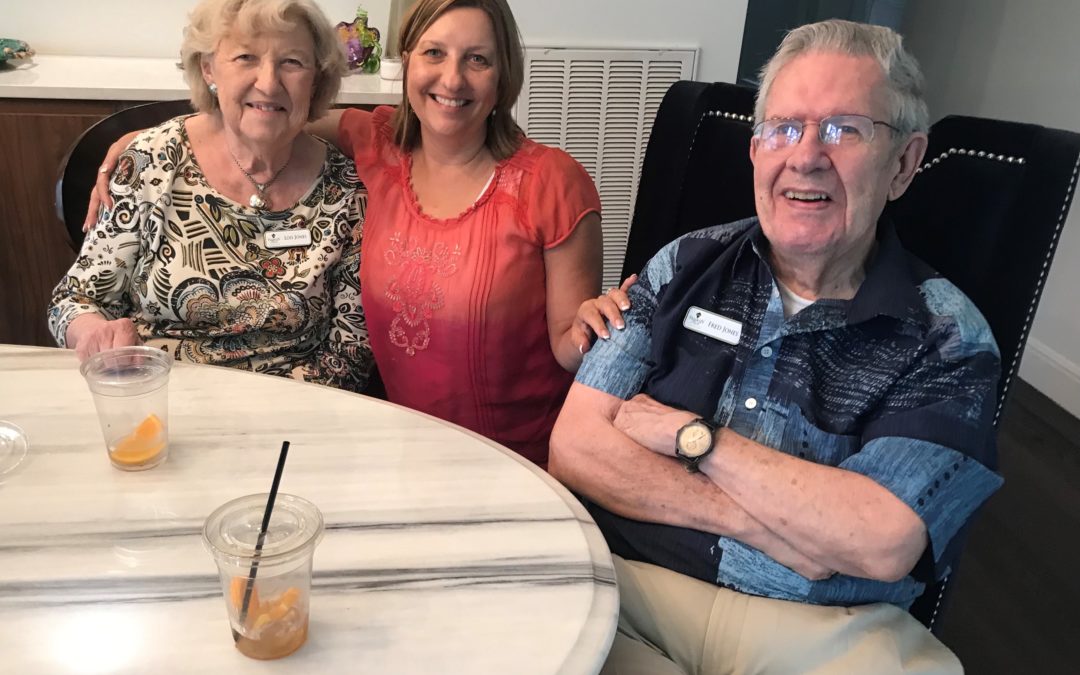It seems to happen so quickly. One day your parent is sprightly and enjoying active retirement, and the next she seems to have aged overnight. The person who was once your role model for independence is suddenly unable — or unwilling — to do the daily activities that living in a home requires. Is it time to evaluate a move to a retirement or assisted living community? How do you decide?
What is assisted living?
Assisted living is part of a long-term-care continuum that provides housing, some health care and personal care services for individuals who need assistance with activities of daily living (ADLs). These activities include bathing, dressing, eating, toileting and transferring. In addition, many assisted living communities help residents with their medications and may provide other types of specialty care, such as dementia care.
Assisted living care and services are designed to:
• Maximize residents’ autonomy, choice, dignity,
independence, privacy and safety;
• Accommodate individual residents’ changing needs and
preferences;
• Minimize the need to relocate; and
• Encourage family and community involvement. (1)
The moving decision
“The biggest indication that it’s time to move is personal safety,” says Shelly Bunce, director of sales and marketing at The Forum at Lincoln Heights. “If your parent is doing things that are unsafe, if you hear her say she wants to do something but feels unsafe, then it’s time to consider a move. If your parent isn’t eating well or if personal hygiene is not what it should be, an alarm should go off in your head.”
Martha Anderson, Independence Hill’s director of sales and marketing, agrees: “When you visit Mom, take a good look around. Are dishes piled up in the sink? Is the refrigerator empty? Is mail piled up on the table? And how about the condition of the house — has maintenance become too overwhelming? At some point, homeownership just becomes a burden, but many people are afraid to admit it.”
Common indicators
How do you determine if it’s time for a parent to make the transition? Here are some common indicators:
Recent accidents or close calls. Has Mom or Dad fallen repeatedly, broken something while trying to install or repair it or experienced a minor car accident? Did you have to take care of the situation, or was your parent able to handle it?
Slow recovery. Has Mom or Dad had difficulty recovering from a recent illness? Are cuts or scrapes healing properly, or do they linger? Did your parent seek medical attention or ignore the problem?
Noticeable weight loss.
Does your parent seem thinner? Many conditions, from illness to depression, cause weight loss. Seniors who live alone often complain that cooking for one is no fun, so they don’t eat, or they snack on foods that are unhealthy.
Increasing frailty. Is a parent suddenly asking you to lift things for them that were never too heavy before? Is Dad slow to rise from that recliner? Does Mom seem unsteady on her feet?
Changes in appearance.
If your mother was always a fashion maven in the past and now she looks disheveled, it’s time for concern. Buttons and zippers require a manual dexterity that seniors may be unable to manage. If your father has suddenly acquired an unkempt beard, remember that shaving is particularly dangerous with a shaky hand. Small changes in appearance can add up to big concerns.
Recall issues. We all forget things, no matter our age. But if your parent is consistently forgetting to take medication, can’t remember how to run the kitchen appliances or how to get to a neighbor’s home, it is time to consider alternatives in the living situation.
Social challenges. Aging and loneliness can be alienating — even if your parents are both alive and living together. People don’t always age at the same rate; it is common for seniors to experience frustration because Dad wants to stay home with the TV and Mom wants to get out. For widows and widowers, depression is a common companion that leads them down a lonely road. If friendships have ended because of health or death, you may see your parent become more and more inactive, frustrated and morose. Does he spend more time in the house, limiting contact with the outside world? Has she given up her weekly visits with her friends? Watch for these behavioral changes.
And how are YOU doing?
While you are gauging your parent’s need for living assistance, take a look at how the situation is affecting you and your family. Many families are affected financially and emotionally by long-term care. If you are the primary caregiver to a parent, you have a right to be tired and occasionally frustrated. Women today are the embodiment of the “sandwich generation.” We have children, careers, husbands and homes that require attention — putting an aging parent with multiple needs on top of that pile is sometimes more than we can handle. If you are facing a long-term-care situation with a parent, whether at home or in an assisted living facility, be sure you take time to care for yourself.
Overcoming objections
If observations lead you to determine it’s time to have the conversation about moving to assisted living, expect objections.
“The biggest objection we hear is ‘I’m not ready!’” says Bunce. “I usually ask them when they will be ready. Often they don’t know why they don’t feel ready and can’t verbalize it. So I ask them why they need their big house — how many rooms are they actually living in? Generally, it’s three rooms. I ask if they know how much maintaining all that extra space is costing them. And I ask if there are things they’d like to be doing with that maintenance money.” That gets them started thinking about a change, Bunce adds. “I always ask ‘I’m not ready!’ objectors to stay for a night or attend a few of our events. What they discover is the opportunity to build new relationships and have fun right at their doorsteps.” “We all have fears about moving to new places,” says Anderson. “When people object to moving to assisted living now, I completely understand. I encourage them to come for lunch and experience what assisted living offers. I remind them that they should make the decision now about where they’d like to live, while they still can. None of us knows what the future will bring, so it’s best to look at all the options and be prepared.”
(1) Choosing an Assisted Living Residence: a Consumer’s Guide. American Health Care Association National Center for Assisted Living.










0 Comments